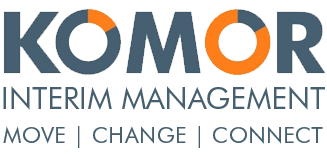Guest Contribution XING “Klartext”
By Ralf H. KOMOR
Interim Manager is not a “trend profession”.
Its presence in the media is due to the fact that the shortage of managers in companies is becoming increasingly apparent. Due to the good economic situation in the DACH region, there is an ever-higher fluctuation at director level and, in parallel, an even shorter retention period for managing directors and board members, which is currently only 5.1 years. This is fuelling demand for temporary support at management level, as there are currently many vacancies to be filled. Interim Management is a very good tool for companies of almost any size to get professionally cleanly completed projects in a short period of time – and this at costs that can be clearly calculated and transparent in advance. Interim Managers are not consultants, they are assertive, confident people. They often adapt ideas from consulting projects to the corporate culture and then implement them consistently with the local people in a tailor-made way. They deliver results.
Why did I become an Interim Manager and how do you get ad-interim mandates?
The experience gained from company sales, mergers and change processes, that when filling management positions, decisions are not always made on the basis of suitability, but rather on the basis of stock affiliation, has opened me up to self-employment. One thing is clear: I burn for success and out of passion; I no longer had any desire for a corporate career or for resentment. In 2014 I was approached by an Interim Management provider for a suitable mandate. The client liked the presentation, decided on me the same day and the following week it started.
When I am asked for a new position, whether through an Interim provider, through XING and LinkedIn or through my personal network, the first thing to clarify is the company’s intention to bring me on board as an Interim Manager. It is important to know the expectations of the client in order to steer all steps in the right direction. The “cultural fit” is also extremely important for both sides: does the Interim Manager have the right stable smell, does he fit in with the company culture, will he appeal to the employees? I summarize the information from the discussions in a presentation that describes the common understanding of the project and is the basis for the successful cooperation in the coming months. This roadmap must be clearly discussed in advance.
What does Interim Management have in store for experienced managers?
Flexibility: you work as a self-employed manager, are not tied to a specific company and can freely choose after the end of the project whether to continue immediately or take some time off. Interim Management jobs usually last only a few months. When to take on the next mandate depends on the personal network and individual ideas. It may also be possible to work only three or four days a week and use the remaining time for private purposes or further education. I decide myself how much I want to work.
Interim Manager is the right profession for all those who want to approach ever-changing tasks undogmatically and have a strong track record in their specialist discipline.
Variety: Switching between cities, regions and industries is part of the essence of Interim Management. Over the past four years I have had five different clients in five different industries, with projects ranging from six weeks to eighteen months in length and 300 km to 600 km from home. At first it is a journey into the unknown. I enjoy getting to know new companies and new people and I have the continuous opportunity to pass on my professional skills in varied and demanding tasks, but also to expand them.
Intensity: It is very intensive work, because clients (shareholders, advisory boards, private equity firms, boards of directors, managing directors) usually call in Interim Managers in special situations (costs too high, turnover too low, projects do not get off the ground or are not completed, …) or in the context of company sales. We need a very quick grasp of the issues, corporate cultures, industries and technologies that change from mandate to mandate in a short period of time. However, one does not have the “political corporate stress”, which burdens some managers more than the professional tasks and responsibilities. I always concentrate on the matter at hand and act apolitical and un-vain. We place ourselves in the service of the cause and do not have to distinguish ourselves. The “colleagues” at management level are usually not afraid of contact after an acclimatisation phase of two weeks, as we do not take away anyone’s job and always act in accordance with our briefing and the task at hand. In the team to be led, I treat the “employees” with respect and very quickly realize that they can learn, are coached in a goal-oriented manner and that the entire organization grows as a result. We Interim Managers come to go and do not stick to the chairs we sit on. As an external employee, I always maintain clear, open and unbiased communication. This promotes knowledge and accelerates many processes.
Disadvantages: as an Interim Manager, you do without your usual private life and circle of friends during the week, as you definitely do not have a nine-to-five job and, if the workload is good, you can expect over 200 hotel nights per year. Since you usually run the business as a single person, there is little chance of scalability.
What are the typical areas of application?
My mandates – as with the average of my colleagues – come primarily from the classic, medium-sized industrial sectors, i.e. from companies in the mechanical and plant engineering sector and from automotive suppliers. The focus is on change processes and project tasks. Working as a specialist – as in my personal example in B2B Sales – brings specialist know-how into the organisation that is not on board. The externally initiated changes lower the inhibition threshold of the employees, break up the silo thinking and let the “fortress mentality” disappear.
What does the requirement profile look like?
In addition to his professional specialisation, the Interim Manager has broad management experience. The key competence is change management: 94% of Interim Managers have change experience, compared to only 65% of permanent managers. He has an extensive portfolio of suitable instruments at his disposal and is also the ideal discussion partner for all members of a company. He can share his findings with stakeholders unfiltered and without vanity. He is the driver with a high analytical ability and implementation strength. He solves the tasks at hand independently, without a crowd of other helpers.
What should be taken into account in the selection process?
For the client, the quality of the management service is decisive. The Interim Manager must be a resilient specialist with strong leadership and implementation skills who has been successful in the discipline he is looking for over decades. Such professionals can be found not only through Interim Providers, but also through associations. Quite clearly: I am talking about the approximately 9,000 Interim Managers as executives at director level or C-level, or with a comprehensive project management function, and not about project or specialist staff. However, I have noticed that temporary specialists also adorn themselves with our job title, although they are used, for example, as technical specialists to support an engineering office without management responsibility. Good Interim Managers can also be found, for example, through the holding company Deutsches Interim Management (DDIM). The DDIM selects new members according to a strict selection procedure to ensure a high-quality standard.
Conclusion: Interim Management is a discipline that I enjoy a lot, gives me the chance to get involved passionately, but also requires a lot of experience and a strict focus on results. After all, the specialised Interim Manager has to assert himself in the promising market by means of clear positioning, continuous training and a clean self-distribution.
Entrepreneurs should act with foresight and not fall into the error of thinking of Interim Management only in difficult times or emergency situations, because: “The best time to fix the roof is when the sun is shining” (John F. Kennedy)
About the author
Ralf H. KOMOR is an Interim Manager, book author and absolute B2B sales professional. Clients ranging from corporate groups to small and medium-sized businesses benefit from his 30 years of experience in national and international projects. He has operational management experience as managing director, member of the management board and authorized signatory. He was and is primarily active for manufacturing companies, in plant construction and in the project business. In the course of his career, he has assumed personnel responsibility for up to 850 employees and sales responsibility for up to 120 million euros. He is passionately involved in the mandates and appreciates working with people at all levels from the corporate environment. He is recognised in the industry as a thoroughbred salesman and heads the DDIM.fachgruppe “Vertrieb & Marketing” (Sales & Marketing), in which proven experts from the Interim Management Sector regularly exchange views on current sales topics and undergo continuous further training. Most recently he was co-author of the book project “Chefsache Interim Management”, which was published by Springer Verlag.
I SUPPORT YOU ON THE WAY TO YOUR SUCCESS
I am a strategist, an innovator, an unconventional thinker, a mover and shaker and therefore I do the right things sooner and better.
And with pleasure also for you.
Together we can discover new market opportunities, steer product branding into the right direction, understand your customers better – and stand out from the competition with tailor-made products for your target group. All this leads to more customer satisfaction, greater customer lifetime value and more sales potential.
Can you afford not to go for it?






